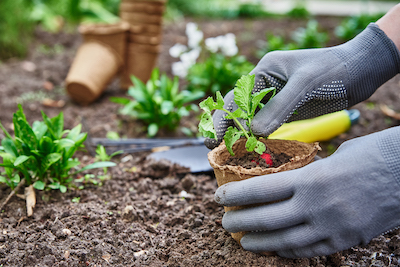Protecting Your Plants: How to Prevent and Address Plant Diseases from Fertilizer Use
Growing lush, vibrant plants is every gardener’s dream, but the improper use of fertilizers can lead to unexpected plant diseases. To ensure your plants thrive, it’s essential to understand how to prevent and address these diseases related to fertilizer use. In this comprehensive guide, we’ll explore various strategies, tips, and insights to help you maintain a disease-free garden. From choosing the right fertilizers to implementing proper application techniques, you’ll learn everything you need to know to nurture your plants effectively.

How to Prevent and Address Plant Diseases Related to Fertilizer Use
Fertilizers are crucial for providing essential nutrients to plants, but their improper use can lead to plant diseases. To ensure your plants remain healthy and disease-free, consider the following strategies:
1. Choose the Right Fertilizer
Selecting the appropriate fertilizer is the first step in preventing plant diseases. Opt for well-balanced fertilizers that provide essential nutrients without causing nutrient imbalances. Look for options labeled as “complete” or “balanced,” as they contain a mix of nitrogen, phosphorus, and potassium (NPK) in the proper proportions.
2. Soil Testing
Before applying any fertilizer, conduct a soil test to assess nutrient levels. This helps you determine which nutrients your soil lacks, allowing you to choose a fertilizer that addresses specific deficiencies. A balanced soil pH also plays a crucial role in preventing diseases, so make necessary adjustments based on the test results.
3. Proper Application Techniques
Applying fertilizers correctly is vital to prevent diseases. Follow recommended dosage instructions and avoid over-fertilization, which can stress plants and make them susceptible to diseases. Apply fertilizers evenly and avoid direct contact with plant foliage.
4. Avoid Excessive Nitrogen
While nitrogen is essential for plant growth, excessive amounts can lead to soft, weak foliage that attracts pests and diseases. Choose slow-release nitrogen fertilizers to provide a steady nutrient supply without overwhelming the plants.
5. Mulching
Mulching around plants helps retain soil moisture, regulate temperature, and prevent weed growth. Organic mulches like straw, leaves, or wood chips break down over time, enriching the soil and promoting a healthy microbial environment that combats diseases.
6. Crop Rotation
Rotate crops each planting season to disrupt disease cycles. This practice prevents the buildup of soil-borne pathogens that can emerge from the continuous planting of the same crops.
7. Proper Watering
Water plants at their base to prevent fungal diseases caused by wet foliage. Use a soaker hose or drip irrigation system to minimize water contact with leaves.
8. Pruning and Sanitation
Regularly prune diseased or dead plant parts to prevent diseases from spreading. Clean gardening tools after each use to avoid transferring pathogens between plants.
9. Beneficial Microorganisms
Incorporate beneficial microorganisms into the soil, such as mycorrhizal fungi and beneficial bacteria. These microorganisms establish a symbiotic relationship with plants, enhancing nutrient uptake and disease resistance.
10. Resistant Plant Varieties
Choose plant varieties that are naturally resistant to common diseases in your region. Resistant plants have built-in defenses that reduce the likelihood of infection.
Identifying the Culprits: Common Plant Diseases Linked to Fertilizer Use
As a dedicated gardener, your ultimate goal is to cultivate a vibrant and thriving garden. However, even with the best intentions and careful planning, fertilizer-related plant diseases can still emerge.
To address these effectively, it’s crucial to recognize the plant diseases that can stem from fertilizer misuse. Here are some common culprits:
1. Fungal Infections
Over-fertilization or improper fertilization practices can lead to excessive growth, which, in turn, creates a damp environment ideal for fungal infections. Diseases like powdery mildew, downy mildew, and root rot are often exacerbated by nutrient imbalances caused by excessive fertilizer.
2. Nutrient Imbalances
Too much or too little of specific nutrients can weaken plants, making them more susceptible to diseases. For instance, an excess of nitrogen can result in lush foliage that attracts pests and diseases, while inadequate phosphorus can lead to poor root development and reduced disease resistance.
3. Stress-Related Diseases
Plants stressed by improper fertilizer use may become more vulnerable to diseases. Stress weakens their natural defenses, making it easier for pathogens to invade. Stress-related diseases include leaf spot, blight, and rust.

Remedies to Plant Diseases: Nurturing Health and Resilience
When plant diseases threaten the vibrancy of your garden, effective remedies are available to restore and protect your plants. Consider the following strategies:
Natural Remedies:
- Neem Oil: Derived from neem tree seeds, neem oil disrupts pests’ life cycles and reduces disease spread.
- Garlic Spray: A mixture of crushed garlic and water acts as a natural antifungal, controlling fungal infections.
- Compost Tea: Nutrient-rich compost tea introduces beneficial microorganisms to the soil, actively combating diseases.
Intervention-Based Remedies:
- Fungicides: Available in various formulations, fungicides inhibit the growth of fungi causing diseases like powdery mildew and rust.
- Bactericides: Tailored for bacterial infections, bactericides help control harmful bacterial diseases.
Incorporating natural remedies strengthens plant immunity and prevents diseases. Intervention-based remedies provide targeted treatments when diseases persist, but a holistic approach, combining preventive measures, natural solutions, and professional guidance, is essential for a resilient, disease-free garden.
Seeking Professional Guidance for Addressing Plant Diseases
If fertilizer-related plant diseases persist despite your best efforts, seeking professional guidance is a wise step. Local agricultural extension offices, gardening clubs, or certified horticulturists can provide tailored advice and recommendations based on your specific situation.
1. Local Agricultural Extension Offices
Local agricultural extension offices are invaluable resources for gardeners seeking guidance on plant health. These offices are staffed with knowledgeable professionals who are well-versed in local soil conditions, climate, and prevalent diseases. They can offer personalized recommendations, disease identification, and advice on suitable fertilization practices.
2. Certified Horticulturists
Certified horticulturists possess specialized training and expertise in plant health and cultivation. Consulting with a horticulturist allows you to tap into their deep understanding of plant biology, nutrient requirements, and disease management. They can assess your garden, diagnose issues, and develop a comprehensive plan to address fertilizer-related diseases.
3. Gardening Clubs and Workshops
Joining a local gardening club or attending workshops can connect you with fellow gardeners and experienced enthusiasts. These forums provide opportunities to share experiences, learn from one another, and gain insights into effective disease management strategies. Collaborating with seasoned gardeners can provide practical solutions and a sense of community support.
4. Online Gardening Forums and Communities
The digital age has brought about a wealth of online resources, including gardening forums and communities. Participating in these platforms allows you to interact with a diverse range of gardeners, including experts and hobbyists. You can seek advice, share your challenges, and learn from the experiences of others who have successfully dealt with fertilizer-related plant diseases.
5. Professional Soil Testing Services
For a comprehensive understanding of your soil’s nutrient composition, consider utilizing professional soil testing services. These services analyze soil samples and provide detailed reports on nutrient levels, pH, and other relevant factors. Armed with this information, you can make informed decisions about fertilization and disease management.
6. Integrated Pest Management (IPM) Consultants
If your garden faces persistent pest and disease challenges, consulting with IPM specialists can be beneficial. IPM consultants employ holistic approaches that encompass biological, cultural, and chemical control methods. They can help you develop a comprehensive plan that addresses both the root causes of diseases and their effects.
7. Garden Supply Stores and Nurseries
Local garden supply stores and nurseries often have knowledgeable staff who can offer advice on plant care and disease management. They can recommend suitable fertilizers, organic treatments, and products designed to combat specific diseases. These experts are attuned to the local gardening scene and can provide practical solutions.
In your journey to combat plant diseases related to fertilizer use, remember that seeking professional guidance is a sign of dedication and a proactive approach to maintaining a healthy garden. These experts bring a wealth of knowledge and experience, offering solutions that align with your gardening goals and the unique conditions of your environment.
FAQs (Frequently Asked Questions)
Can over-fertilization really lead to plant diseases?
Absolutely. Over-fertilization can disrupt the balance of nutrients in the soil, leading to stressed plants that are more susceptible to diseases.
Should I completely avoid using nitrogen-rich fertilizers?
No, nitrogen is essential for plant growth. Just ensure you use them in moderation and opt for slow-release formulations.
What is the role of pH in preventing plant diseases?
Soil pH affects nutrient availability and microbial activity. Proper pH levels create an environment where plants can better fend off diseases.
Can I prevent diseases by using organic fertilizers only?
While organic fertilizers can contribute to soil health and disease prevention, proper application techniques and overall plant care are equally important.
How often should I rotate my crops?
Rotate crops annually or based on the specific recommendations for the plants you’re growing. This helps break disease cycles and maintain soil health.
Are there any natural remedies for plant diseases?
Yes, natural remedies like neem oil, garlic spray, and compost tea can help control certain plant diseases. However, prevention is key.
Conclusion:
Maintaining healthy plants while using fertilizers requires a combination of knowledge, proper techniques, and diligent care. By following the strategies outlined in this guide, you can effectively prevent and address plant diseases related to fertilizer use. Remember to choose the right fertilizer, prioritize soil health, and implement best practices in planting and care. With these steps, your garden will flourish, showcasing your commitment to nurturing vibrant, disease-free plants.

